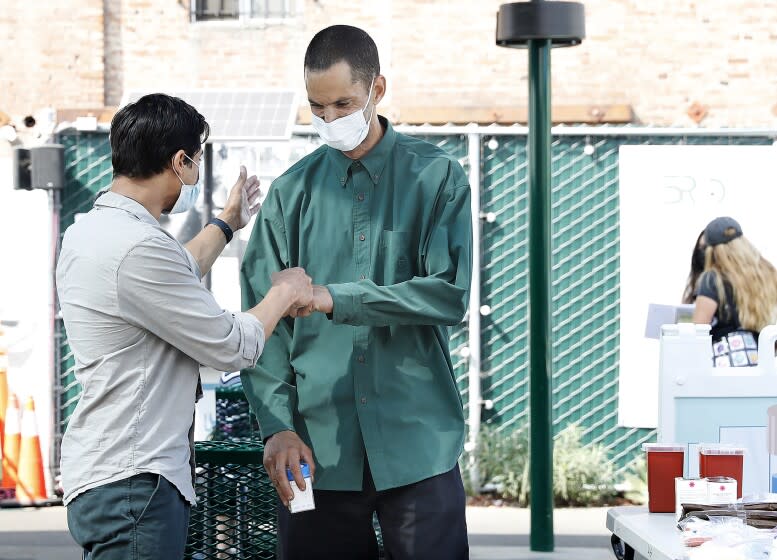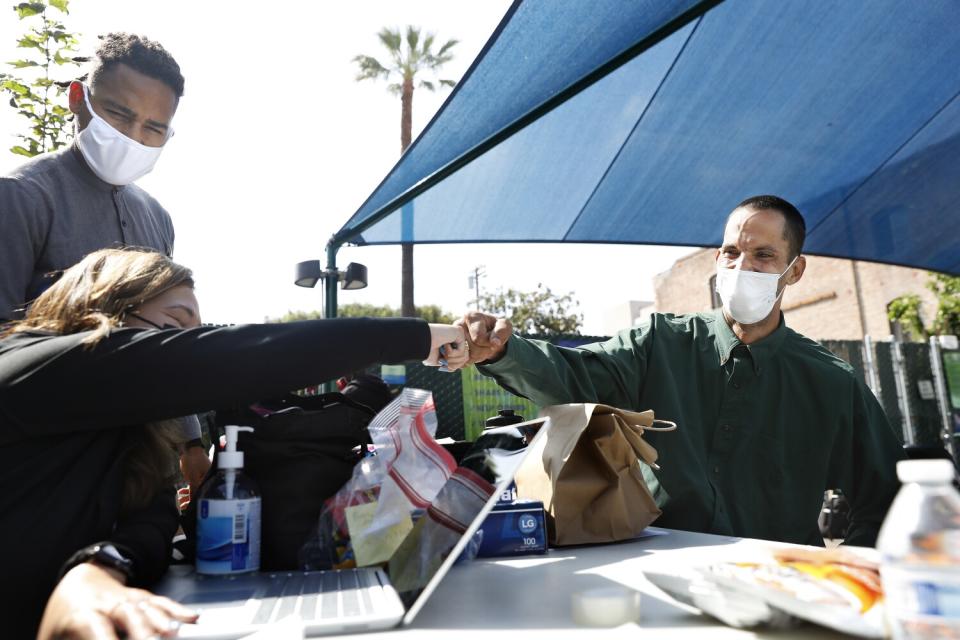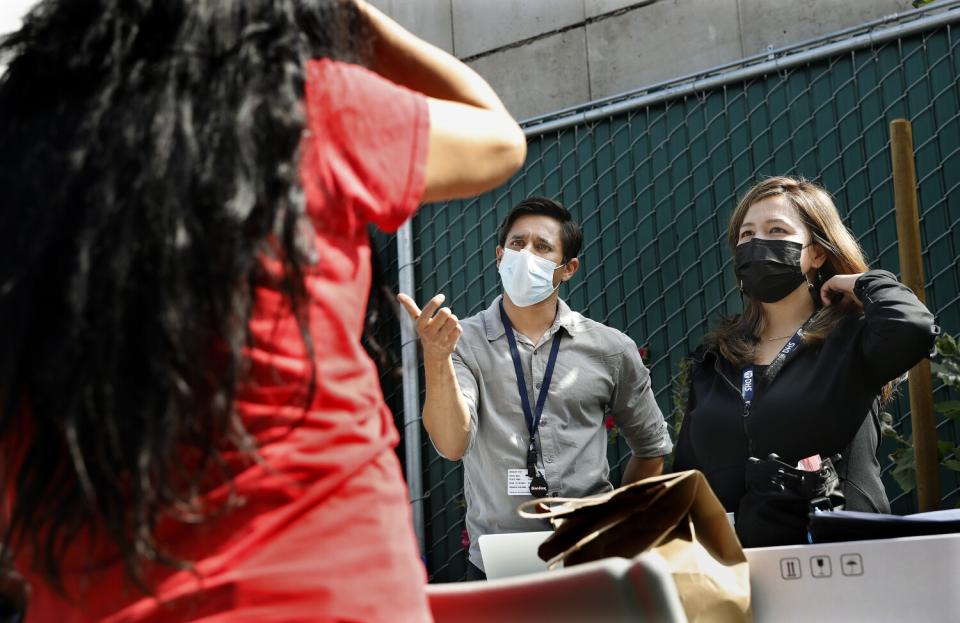Can a Target gift card help you stay off meth? This L.A. program is trying it

Mark had been wanting to quit using meth for a while when someone pointed him to the folding table propped up at the skid row site where homeless people stop for showers and laundry.
If his urine tested negative for stimulants, the man advised him, "they give you a gift card."
Behind the table, a program assistant hastened to clarify that it was a chance at a gift card — just a chance. But a chance was enough for Mark, who began filling out paperwork to sign up for the 12-week program, hoping the incentive could help him break from his addiction.
"I've lost everything. My family. My kids. My grandkids. My wife. My housing. Just everything," said the 56-year-old, who declined to give his last name. He has been living in a van in South Los Angeles. "It's really affecting me bad. But it's hard not to do it."
It is a simple idea at first glance: Giving people rewards, week by week, can encourage them to keep doing difficult things.
Researchers say such "contingency management" programs use the reward systems in the brain to nudge people away from drug use.
"This isn't just paying people to do what they should do," said Steve Shoptaw, a UCLA professor of family medicine who has researched treatments for stimulant use disorder. "This is an intervention that actually stimulates the brain to work in different ways so that their goals are met."
But in drug treatment in Los Angeles County, contingency management remains uncommon, despite strong evidence that such programs can help people stop using meth and other stimulants that can derail and end lives.
Last year, more than 1,700 people in L.A. County died from overdoses that involved methamphetamine — including 430 deaths in which meth was the only drug identified by the county coroner, according to county figures.
Across the country, laws against paying patients for business under federally funded health programs have inhibited efforts to offer gift cards or other rewards as an incentive for staying off drugs. Federal officials have carved out exceptions, but such programs have also run up against philosophical objections to providing external rewards for abstinence.
In California, a bill that would have broadly authorized Medi-Cal to cover such incentive programs was vetoed last year by Gov. Gavin Newsom, who said it should first be tested under a pilot program. That pilot, initially scheduled to launch in July, has since been pushed back to this fall, and state officials say that the federal government has “explicitly recognized” that the incentives planned under the program do not violate the federal rules.
Proponents argue that the method has already proved itself, including at the Department of Veterans Affairs, where such programs have been used to help people quit stimulants for over a decade. The National Institute on Drug Abuse has called such interventions "highly effective." Physicians see it as an especially important tool in helping people get off meth, for which no medications are yet approved by the Food and Drug Administration.
"This would be the gold standard if it was a medication," said Dr. Siddarth Puri, an addiction psychiatrist at LAC+USC Medical Center who has taken its contingency management program outside the hospital walls, setting up a table once a week at the Skid Row Community ReFresh Spot, where homeless people go to shower, use restrooms, do laundry and get other services.
The LAC+USC program is not a part of the state pilot, but was funded through a $250,000 grant from the Center at Sierra Health Foundation. It has enrolled dozens of people who are supposed to check in twice weekly, once at the ReFresh Spot, and once by smartphone, sending in an image of their test results between Tuesday visits.
If their urine tests negative, participants get the opportunity to randomly choose a number, which is checked against a numbered list of rewards — either a Target gift card for $10 or $20 or a spoken "affirmation" like "You're working hard at this." The longer someone stays off of meth or other stimulants, the more chances they have to choose a number and win.
Damion Corral stopped by the ReFresh Spot recently to greet Puri and nurse practitioner Marie Eugenio.
"Let's take a look," Eugenio said, holding up his urine sample to check if it tested positive. It did not. "Beautiful! Beautiful."
Because Corral had tested negative week after week, he had 16 chances to win an incentive. He decided to make it simple and count down from 16. With each number, Eugenio consulted the numbered list and either announced the amount of his Target gift card or offered him a fist bump and a few words of encouragement.
"Your effort empowers you," she told Corral, who then counted down the next number, which led her to again announce, "Your effort empowers you!"
"I am empowered today!" Corral replied, beaming.
As they wrapped up, Eugenio exclaimed, "Damion, I'm so proud of you!" and handed him a stack of gift cards.
Corral had arrived dressed neatly in a green button-down shirt, slacks and shoes that he had bought with gift cards he received through the program. The 45-year-old, who has been living in a hotel leased for unhoused people through Project Roomkey, has also been getting substance use counseling to avoid the drugs he has used on and off since he was 19. As of early June, he had been sober more than two months, he said.
"It's an added incentive to help me stay sober," he said of the LAC+USC program. "It's hard enough on its own. To actually be blessed for doing it — that's something that helps out for sure."

::
Quitting meth means a tumultuous shift in brain chemistry. People feel gratification when the brain releases dopamine, known as a "feel-good" hormone. The dopamine payoff from meth is massive. Puri pulled up a graph showing how dopamine surges from smoking cigarettes or using cocaine, below a skyrocketing line for meth far steeper than anything else on the chart.
People who use meth experience "heightened energy. Better attention. A certain degree of euphoria. And that type of feeling is very rewarding," said Dr. Eric Chavez, principal investigator with the Artemis Institute for Clinical Research in San Diego. "So the brain pathways that are associated with reward get hijacked with methamphetamine because it creates that experience artificially."
When people initially stop using meth, in turn, "they often feel pretty lousy, and that lousy feeling leads them back to drug use," Shoptaw said, because using meth again "wipes away the lousy."
For many people who try to quit, meth withdrawal begins with days of "sleeping a lot, eating a lot, drinking a lot of water" before a second phase lasting up to six weeks, in which the sensitivity of dopamine receptors is reset, Shoptaw said.
That second phase can feel pretty good, but many people then endure a third phase — a "chronic withdrawal period" of up to six months involving mild issues with attention and processing that can cause people to feel "kind of 85% of normal," Shoptaw said. Craving can run throughout the withdrawal process.
Incentives like gift cards are one way of trying to redirect that chemical system. "Dopamine is triggered in every substance use disorder," said Dr. Brian Hurley, medical director of the Division of Substance Abuse Prevention and Control at the L.A. County Department of Public Health. When someone gets a reward, "it piggybacks on that same dopamine circuit."
Some medications have also been shown to help people get off methamphetamine: Shoptaw is among a group of researchers who assessed whether people who use methamphetamine could benefit from a combination of two medications: naltrexone, which is used for alcohol and opioid use disorders, and the antidepressant bupropion.
The findings, published last year in the New England Journal of Medicine, showed that the medications resulted in an added 11% of participants reducing their meth use — a result that Shoptaw said was comparable to approved medications for alcohol use disorder and could be layered with other therapies.
Physicians have also seen promising results from the antidepressant mirtazapine, but those and other existing medications have yet to be approved by the FDA for treating methamphetamine use disorder, although they have been FDA-approved for other uses. Doctors can offer them "off label," but Hurley said that some providers are reluctant to do so.
Methamphetamine hijacks several systems of neurotransmitters in the brain, and "nobody has come up with a blocker yet that will selectively block the effects of meth in those receptors without impacting other functions," said Dr. Brooks Gentry, chief medical officer of InterveXion Therapeutics. Gentry and fellow researchers have instead been exploring whether monoclonal antibodies — now commonly known as a method to combat COVID-19 — could bind with methamphetamine in the bloodstream and pull it away from the brain.
The idea is that an infusion of the antibodies could work for weeks afterward, forestalling the effects of using meth and potentially reducing its allure. In Washington state, Dr. Tom Robey has been working to enroll patients who come into the emergency room in a clinical trial to test the antibody treatment, which takes about a half-hour to administer through an IV.
Robey, an emergency physician at Providence Regional Medical Center Everett, said he was skeptical at first, but what he has seen so far is "remarkable."
"If they're paranoid, they aren't anymore. If they're anxious, oftentimes they'll just fall asleep" after getting the treatment, Robey said. "It's like all of a sudden they no longer have to worry about whatever the meth is doing to their brain." The change is evident in just a few hours at the ER, he said, but is even more startling after a few days.
People return "clearheaded, usually with a big smile on their face," and recount the steps they've taken to get their lives back on track, Robey said.
::
Even if the ongoing trials for that treatment prove successful, however, InterveXion says that such an antibody treatment is likely years away for most patients. In the absence of an FDA-approved, widely embraced medication for treating methamphetamine use disorder, California officials have turned to incentives as a tool.
Under the pilot program soon to launch in California, participating providers will be able to get Medi-Cal reimbursement for the practice. L.A. is among two dozen counties that will test the approach in a 24-week program, allowing people to earn up to $599 total in gift cards as an incentive to stay off meth and other stimulants.
One of the lingering questions about the strategy is whether it has staying power, with some studies calling into question whether its effects endured after several months. In a more recent analysis, however, researchers from the University of Connecticut and other institutions found that six months after the treatment ended, people who had been encouraged through such incentive programs were 22% more likely to remain abstinent than people who had gotten other treatments.
"We're honest with patients," said Puri, the LAC+USC addiction psychiatrist. The dopamine surge from winning a gift card is "never going to feel as good as when you're using meth. But look at all the stuff that you're avoiding. You're not going to jail. You're not struggling for housing. You're not self-mutilating."

Puri sees it as a part of a broader strategy to help people stop using drugs. He and Eugenio talk with participants about each week: Things that made it harder to abstain. Things that helped. On a recent morning, Puri took time to talk to a woman after her urine was tested, chatting about the ups and downs of her week.
"What's interesting is that you had a stressor, but then you didn't end up using," he said. "What was different about that?"
Prayer helped, the woman told him. So did counseling. Puri nodded.
"It's these little victories," he replied, "that carry you to the next one."
This story originally appeared in Los Angeles Times.

